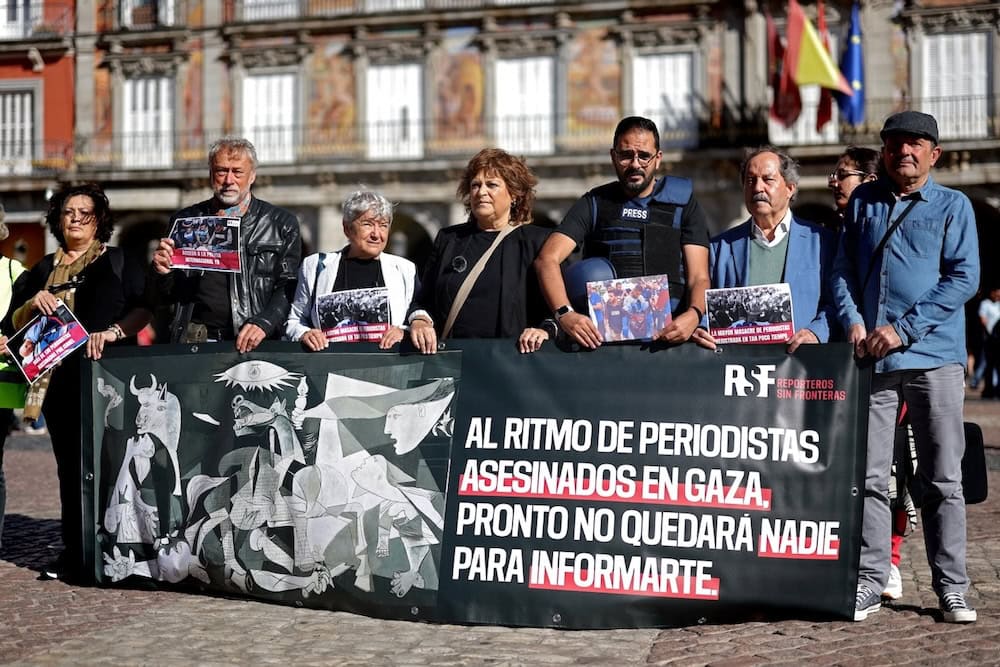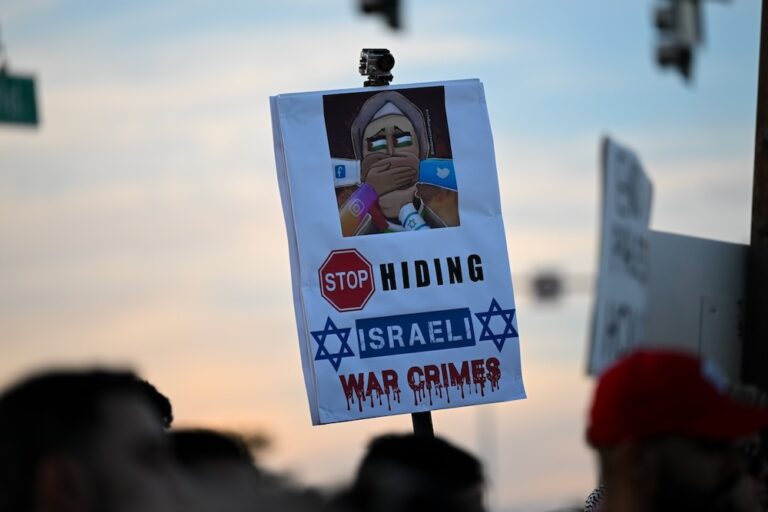"Journalists have the right to do their jobs reporting on this war, and we all have the right to know what is happening in Gaza."
This statement was originally published on rsf.org on 3 October 2024.
Journalists targeted and killed, newsrooms destroyed, internet and electricity cut off, foreign press blocked: since the start of the war in Gaza, Israeli forces have methodically destroyed the Palestinian territory’s media infrastructure and stifled journalism. Reporters Without Borders (RSF) stands in solidarity with Gaza’s journalists and reiterates its urgent call to the international community to protect them.
Since the first bombs fell on Gaza on the morning of 7 October 2023, following Hamas’ bloody attack on Israel, the right to information about what is happening in the Palestinian enclave has continued eroding with each passing day as the Israeli army’s media blackout continues.
In one year, more than 130 Palestinian journalists have been killed by Israeli forces in Gaza. According to RSF’s information, at least 32 of them were targeted and killed while working. Almost all the journalists in this closed territory have been displaced several times in the past year, and the few who have been forced into exile have no prospect of returning. Meanwhile, Israeli authorities continue to close access into Gaza for foreign journalists. The few reporters who have been permitted to enter Gaza from the outside were only able to do so under the strict surveillance of the Israeli army.
The repression does not end there: press offices have been destroyed; reporters have been arrested and tortured, according to RSF’s information; and internet and electricity are regularly cut off. Journalists who continue to work against all odds in this closed territory are frequently victims of propaganda campaigns that question their integrity, accusing them of working with combatants or having participated in the 7 October attacks.
These shocking violations of press freedom have been met with widespread impunity. Despite the four complaints RSF filed with the International Criminal Court (ICC) for war crimes against journalists in Gaza, and the assurances that the ICC prosecutor’s office gave to RSF in January, the perpetrators have still not been brought to justice, and the crimes continue. Although the Israeli authorities have often claimed they do not target journalists, multiple testimonies, investigations, and even statements given by the Israeli army contradict this claim.
“A full year of war has meant a year of unprecedented violence against journalists, with Gaza’s press corps now decimated and foreign journalists still barred from entering the strip. Israeli forces have done everything in their power to prevent coverage of what is happening in Gaza, and have systematically targeted journalists who have taken tremendous risks to do their jobs. This has in turn impacted the global public’s access to information on the war, which is overwhelmingly in the public interest. Journalists have the right to do their jobs reporting on this war, and we all have the right to know what is happening in Gaza. RSF calls in the strongest possible terms for an immediate stop to violence against journalists in Gaza, for concrete actions to end impunity for the attacks that have already occurred, and for access to be opened to foreign journalists without delay.”
Rebecca Vincent, RSF’s Director of Campaigns
Repression beyond Gaza
Journalists elsewhere in Palestine have also been subjected to violent repression over the past year, in the shadow of the war in Gaza. Since 7 October, dozens of journalists from the West Bank have been detained and remain in Israeli prisons. The headquarters of Al-Jazeera in Ramallah were closed down by armed soldiers last September on charges of propaganda. A law approved by the Israeli parliament in November 2023 justified the ban on Al Jazeera‘s channel in Israel that was put in place on 14 June 2024. This censorship also affects other outlets: on 21 May, the Israeli army seized a camera belonging to the Associated Press news agency and cut off its continuous filming of Gaza for several hours on the pretext that these images were supplied to Al Jazeera, among other media. Israeli reporters criticising the war in Gaza and the policies of Prime Minister Benjamin Netanyahu’s government have also been victims of repression, intimidation, and police violence since 7 October 2023.
The war in Gaza extends to countries in the region : in Lebanon, three journalists were killed by the Israeli army while working, according to RSF’s information. Although six investigations — including one by RSF — prove that Reuters photojournalist Issam Abdallah was targeted by Israeli forces on 13 October 2023, no authority has been held responsible for this crime to date. A year later, the war has intensified and now Lebanese journalists risk finding themselves victims of massacres as well, as many of them have been forced to evacuate their homes and work from increasingly dangerous areas. In anticipation of the crisis, RSF opened a regional press freedom centre in Beirut in March 2024 to help equip and protect journalists in the region.



